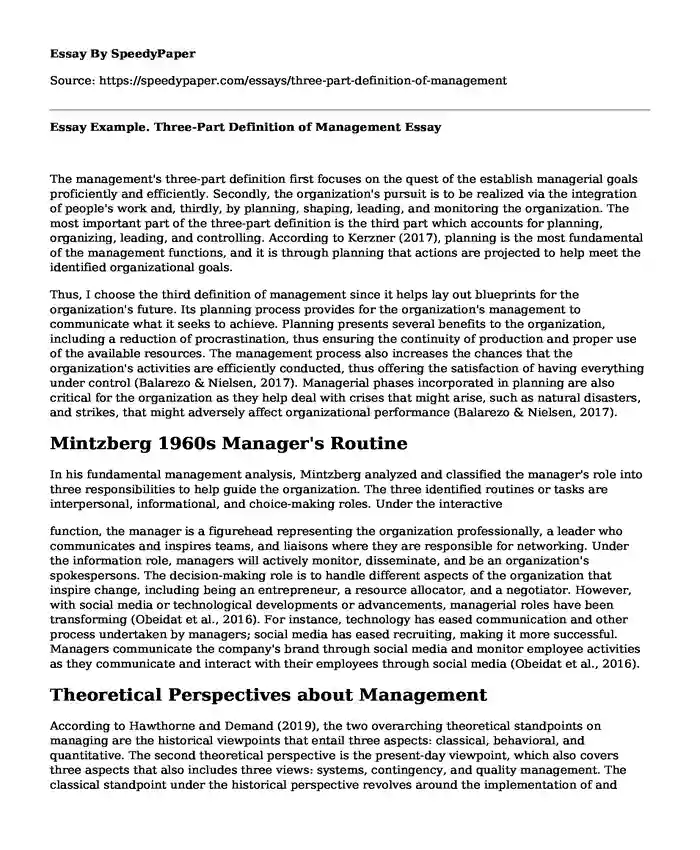
| Type of paper: | Essay |
| Categories: | Planning Goal Management |
| Pages: | 3 |
| Wordcount: | 655 words |
The management's three-part definition first focuses on the quest of the establish managerial goals proficiently and efficiently. Secondly, the organization's pursuit is to be realized via the integration of people's work and, thirdly, by planning, shaping, leading, and monitoring the organization. The most important part of the three-part definition is the third part which accounts for planning, organizing, leading, and controlling. According to Kerzner (2017), planning is the most fundamental of the management functions, and it is through planning that actions are projected to help meet the identified organizational goals.
Thus, I choose the third definition of management since it helps lay out blueprints for the organization's future. Its planning process provides for the organization's management to communicate what it seeks to achieve. Planning presents several benefits to the organization, including a reduction of procrastination, thus ensuring the continuity of production and proper use of the available resources. The management process also increases the chances that the organization's activities are efficiently conducted, thus offering the satisfaction of having everything under control (Balarezo & Nielsen, 2017). Managerial phases incorporated in planning are also critical for the organization as they help deal with crises that might arise, such as natural disasters, and strikes, that might adversely affect organizational performance (Balarezo & Nielsen, 2017).
Mintzberg 1960s Manager's Routine
In his fundamental management analysis, Mintzberg analyzed and classified the manager's role into three responsibilities to help guide the organization. The three identified routines or tasks are interpersonal, informational, and choice-making roles. Under the interactive
function, the manager is a figurehead representing the organization professionally, a leader who communicates and inspires teams, and liaisons where they are responsible for networking. Under the information role, managers will actively monitor, disseminate, and be an organization's spokespersons. The decision-making role is to handle different aspects of the organization that inspire change, including being an entrepreneur, a resource allocator, and a negotiator. However, with social media or technological developments or advancements, managerial roles have been transforming (Obeidat et al., 2016). For instance, technology has eased communication and other process undertaken by managers; social media has eased recruiting, making it more successful. Managers communicate the company's brand through social media and monitor employee activities as they communicate and interact with their employees through social media (Obeidat et al., 2016).
Theoretical Perspectives about Management
According to Hawthorne and Demand (2019), the two overarching theoretical standpoints on managing are the historical viewpoints that entail three aspects: classical, behavioral, and quantitative. The second theoretical perspective is the present-day viewpoint, which also covers three aspects that also includes three views: systems, contingency, and quality management. The classical standpoint under the historical perspective revolves around the implementation of and maximizing organizational processes. The behavioral aspects focus on boosting the human element and perceiving the workplace as a social environment. Simultaneously, the quantitative approach incorporates modern scientific procedures and system thinking to the managerial process. The contemporary perspective's approach is covered by the three quantitative theories focusing on the application of multiple disciplines to help integrate operations and enhance performance. The systems approach focuses on organizations as interrelated components, and managers have to support the organization's goals. The contingency approach redefined effective management. It requires managers to adapt to unique situations and circumstances by making better use of technology.
References
Balarezo, J., & Nielsen, B. B. (2017). Scenario planning as an organizational intervention. Review of international business and strategy. Retrieved from https://researchapi.cbs.dk/ws/files/57287300/bo_bernhard_nielsen_scenario_planning_as_organizational_intervention_acceptedversion.pdf
Hawthorne, M., & Demand, M. (2019). Management theories & concepts in the workplace. Demand Media, Chron. Retrieved from https://smallbusiness.chron.com/management-theories-concepts-workplace-17693.html
Kerzner, H. (2017). Project management: a systems approach to planning, scheduling, and controlling. John Wiley & Sons.
Obeidat, B. Y., Al-Suradi, M. M., & Tarhini, A. (2016). The impact of knowledge management on innovation. Management Research Review. Retrieved from https://www.emerald.com/insight/content/doi/10.1108/MRR-09-2015-0214/full/html
Cite this page
Essay Example. Three-Part Definition of Management. (2023, Sep 27). Retrieved from https://speedypaper.net/essays/three-part-definition-of-management
Request Removal
If you are the original author of this essay and no longer wish to have it published on the SpeedyPaper website, please click below to request its removal:
- 7 Things a Good Student Should Do, Essay Example
- The Airplane Crash - Free Essay for You
- The Blindside Book vs. Movie - Comparison Essay Example
- Free Essay in Time Management: Examinations Research
- Essay Sample on Short-term and Long-term Career Goals
- Poems Comparison Essay Sample: To An Athlete Dying Young and Ex-Basketball Player
- Information Visibility and Transparency - Free Paper Sample
Popular categories




